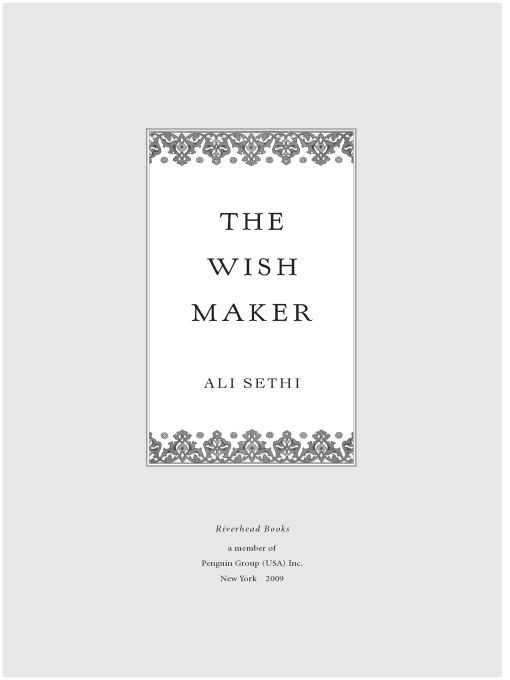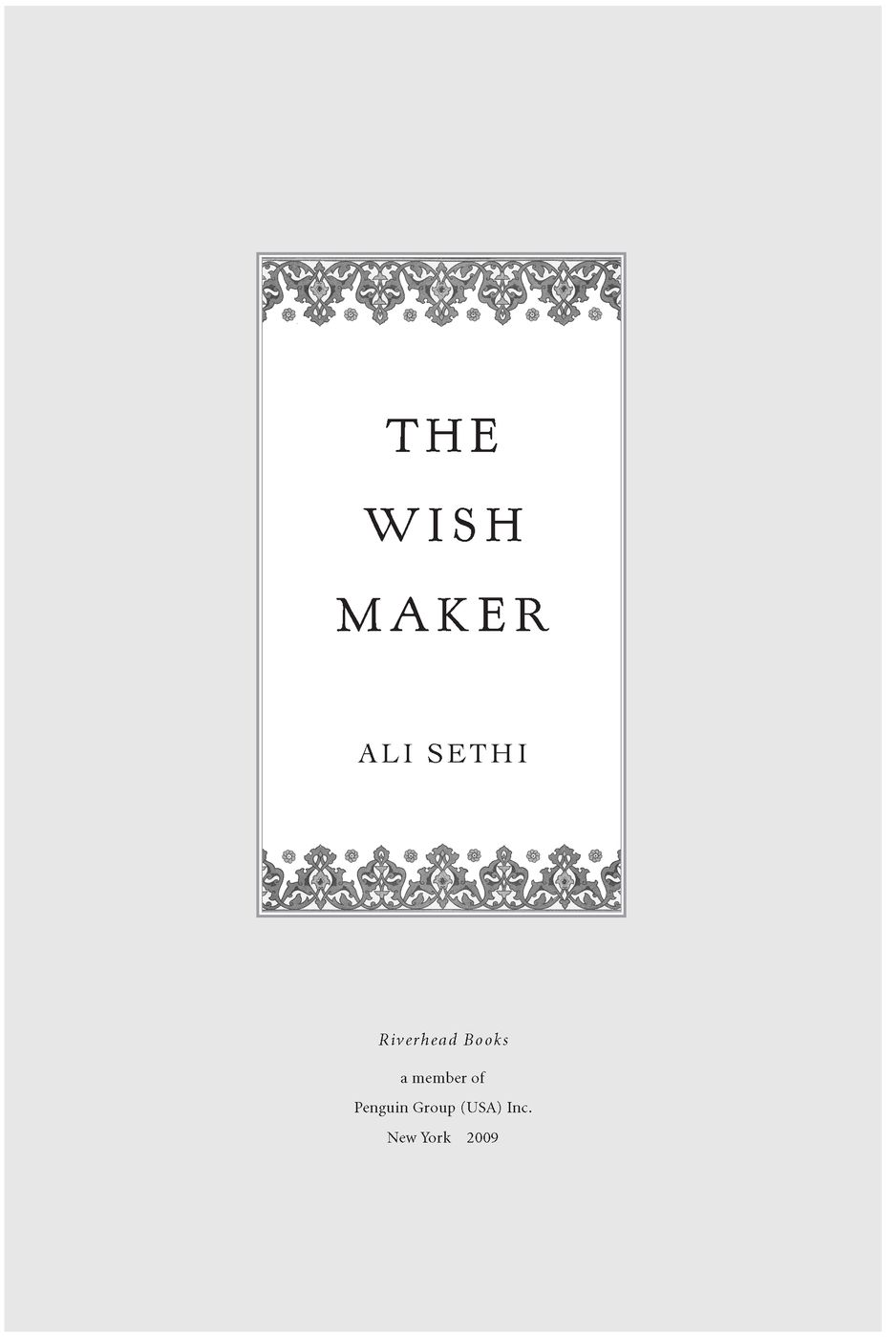The Wish Maker
Authors: Ali Sethi

Table of Contents


RIVERHEAD BOOKS
Published by the Penguin Group
Penguin Group (USA) Inc., 375 Hudson Street, New York, New York 10014,
USA Penguin Group (Canada), 90 Eglinton Avenue East, Suite 700,
Toronto, Ontario M4P 2Y3, Canada (a division of Pearson
Canada Inc.) Penguin Books Ltd, 80 Strand, London WC2R 0RL,
England Penguin Ireland, 25 St Stephen’s Green, Dublin 2, Ireland
(a division of Penguin Books Ltd) Penguin Group (Australia),
250 Camberwell Road, Camberwell, Victoria 3124, Australia (a division of
(a division of Penguin Books Ltd) Penguin Group (Australia),
250 Camberwell Road, Camberwell, Victoria 3124, Australia (a division of
Pearson Australia Group Pty Ltd) Penguin Books India Pvt Ltd,
11 Community Centre, Panchsheel Park, New Delhi-110 017, India
Penguin Group (NZ), 67 Apollo Drive, Rosedale, North Shore 0632,
New Zealand (a division of Pearson New Zealand Ltd)
Penguin Books (South Africa) (Pty) Ltd, 24 Sturdee Avenue,
Rosebank, Johannesburg 2196, South Africa
Penguin Books Ltd, Registered Offices:
80 Strand, London WC2R 0RL, England
80 Strand, London WC2R 0RL, England
All rights reserved. No part of this book may be reproduced, scanned,
or distributed in any printed or electronic form without permission. Please do
not participate in or encourage piracy of copyrighted materials in violation
of the author’s rights. Purchase only authorized editions.
or distributed in any printed or electronic form without permission. Please do
not participate in or encourage piracy of copyrighted materials in violation
of the author’s rights. Purchase only authorized editions.
Library of Congress Cataloging-in-Publication Data
Sethi, Ali.
The wish maker / Ali Sethi.
p. cm.
p. cm.
eISBN : 978-1-101-06128-2
1. Boys—Fiction. 2. Fatherless families—Fiction. 3. Women—Pakistan—
Fiction. 4. Pakistan—Social life and customs—Fiction. I. Title.
PR9540.9.S46W
823’.92—dc22
This is a work of fiction. Names, characters, places, and incidents either are the product of the author’s imagination or are used fictitiously, and any resemblance to actual persons, living or dead, businesses, companies, events, or locales is entirely coincidental.
While the author has made every effort to provide accurate telephone numbers and Internet addresses at the time of publication, neither the publisher nor the author assumes any responsibility for errors, or for changes that occur after publication. Further, the publisher does not have any control over and does not assume any responsibility for author or third-party websites or their content.
For Dadi Apa
The difficult task of knowing another soul is not for young gentlemen whose consciousness is chiefly made up of their own wishes.
Middlemarch
ONE
1

The clouds approached from below and went upward and onward until they had left behind the view; it was of the turf, gray turning to green and brown, a mosaic that now grew zones and roads and began to show the specks, expanding into vehicles, that were moving and heading in the pale morning light to destinations of their own.
Naseem was at the airport. She stood near the railing with her small, stout form pressed ahead into the bars. Her feet were placed solidly apart; she was trying to thwart the pushing crowds, trying to dominate the commotion with the square cardboard sign that was held above her head. It said my name (MISTER ZAKI SHIRAZI) in my mother’s assertive handwriting.
I waved.
Naseem saw. She lowered the cardboard and grinned.
“Salaam, Naseem.”
She embraced me and tried to take my suitcase.
“Don’t worry, Naseem—”
“No, no.”
“Naseem—”
“No.”
“But—”
“No, no.”
I followed her outside. The air was moist and cold, and the sky was smothered. The new airport had a beige exterior (the old one was white) and was planted with advertisements in the parking lot: we went past a sign for a restaurant chain, then a live screen that was showing an ad for a new brand of toothpaste. The ad was soundless; it ended with a splash of color and started up again.
“It’s not that cold,” I said.
“You’re right,” said Naseem. “It’s not.”
The car was in the last row. A man was waiting inside, a young and relaxed-looking man with his knees drawn up to the steering wheel, his wrists crossed in stylish repose behind his head. He saw us and sprang up; he smiled and nodded vigorously and shook my hand and hurried to take the suitcase from Naseem, who didn’t introduce him and instead monitored his movements with a tolerating look, the assessing, unsmiling stringency of delegated authority. She stood behind him and watched as he lifted the suitcase with a moan and hauled it into the trunk. The impact sent up the smell of new carpeting.
“Had it serviced,” said Naseem.
She sat next to the driver and gave him unnecessary directions out of the parking lot. At the tollbooth she gave him ten rupees, which he gave to the warden beyond his window.
“Receipt,” said Naseem, and secured it notingly.
The driver rolled up his window and began the drive away from the parking lot, away from the airport and out onto the road. His hands gripped the steering wheel. He was frowning in concentration and licking his lips.
“New driver,” said Naseem.
“I see,” I said.
“Yes,” she said.
We drove along a curve in the road and the car tilted, and Naseem reached for the strap above her window. Then the road was straight again. A part of it was cordoned off and still being paved; the laborers were absent and had left behind some of their implements as a promise of return. The road led into the bazaar and became cracked and dusty and crowded. Naseem was still holding on to the strap, and switched on the radio with her free hand; it interfered with the noise, the bumping and the shuddering, which lasted for some minutes. After that the bazaar was gone and the road was smooth again: we were in Cantt now, among large residential walls overgrown with bougainvillea and ivy, and among old trees and parks and military compounds that grew behind unproclaiming gates. The road was mostly empty. The driver became emboldened and skipped a traffic light, then another. Naseem didn’t stop him. She was absorbed in the radio: a female voice was lecturing its audience in a soft American accent on the perils and advantages of love. The voice laughed from time to time and Naseem laughed with it, and brazenly, for she was laughing at the audacity and outrageousness of the concept. She slapped her thigh and shook.
“Radio,” she said with a fond nod toward the thing.
“Ah, yes,” I said. “Radio . . .”
We drove for some minutes in a radio-expecting silence.
“So, then,” she said, “how is America?”
“America is well,” I said, as though formerly it wasn’t. I wanted to say more but the question was vast.
“Good,” said Naseem. “And how are your studies?”
“My studies are very well.”
“Very good.” She paused, holding on to her strap, her smile one of accepting and continuing goodwill. “You know there is no place like Saudia.”
She had been recently to perform the Hajj in Saudi Arabia.
“Really?”
“No place like it in the world,” she said, and gave her head a slow and solemn shake. “Everything, they have: KFC, McDonald’s, anything at all, you name it and they have it.”
“Really.”
“Oh yes. And the house of God—it opens up your eyes. Everyone is there: black, white, this, that, everyone from everywhere. Over here I am a servant, but over there no one is a servant. It has such a feeling of peace that your heart fills up with tears. I kissed the Black Stone with my own lips.”
“How does it feel?”
She blinked, trying to recall the experience. It took her a moment. “Like a stone,” she said eventually, with a note of surprise.
We passed a billboard on the bridge. It was advertising a new deal for mobile phones. The model was a local girl who had her shiny shoulders up in a shrug; one hand held her pelvic bone, the other pressed a phone to her ear. Her head was tilted and her enlarged eyes were startled. “Where is everyone?” I asked.
“Here and there,” said Naseem. “No rest in this time. But weddings will do that. Always, always, it is madness. You will see when you get home. No one is the same.”

Other books
Lesbian Mind Control Adventures: One by McKenna Danvers
Seven Wonders Book 1: The Colossus Rises by Peter Lerangis
Cutter's Hope by A.J. Downey
Written in the Stars by Ardente-Silliman, Jayme
Tratado de la Naturaleza Humana by David Hume
The God Mars Book One: CROATOAN by Michael Rizzo
Say You Love Me by Patricia Hagan
Zoey Avenger (Incubatti Series Book 2) by Lizzy Ford
A Column of Fire by Ken Follett
Unraveled (Love in Salem, book 2) by Delaney, Emma